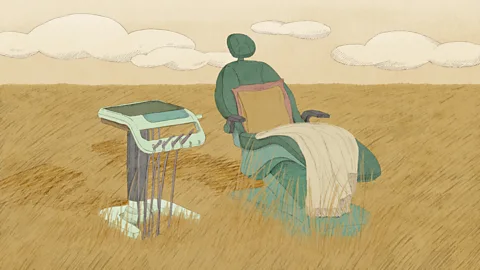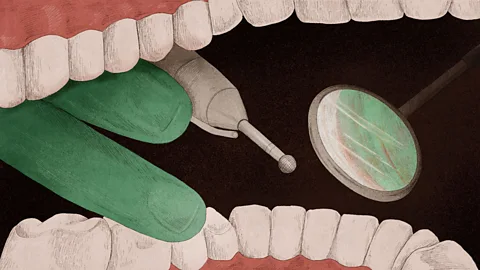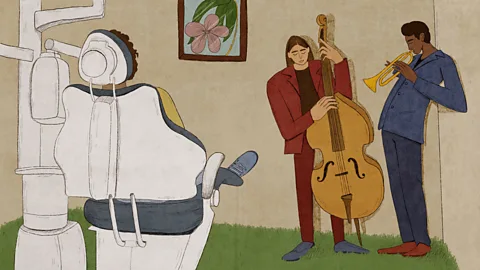A tooth examination can be terrifying for victims of rape and assault. These dentists want to help them
 Prashanti Aswani
Prashanti AswaniLying vulnerable in a chair as someone pokes around your mouth with sharp implements is unpleasant for most people. For those who have suffered trauma, it can be immensely triggering. New forms of dentistry hope to change that.
Gina makes ceramics and does voluntary environmental work in the Australian state of Victoria. She's now 58. But the abuse she suffered as a child has had long-lasting effects on not just her mind, but also her mouth.
For one thing, she started grinding her teeth as a child – in general, bruxism is associated with stress. Another coping mechanism she developed was related to food, "because when you're anxious and depressed you eat sweet food to cheer yourself up", says Gina, whose name has been changed to protect her identity. Depression also made her less able to take care of her teeth, which caused her to feel shame.
Content warning: descriptions of family violence and sexual assault.
Her dental care was sporadic, because "when you're abused, you don't feel like you're worth looking after". At one point she went 15 years without seeing a dentist. The combination of factors led to gum disease and tooth loss.
Finally, when the pain became unbearable, a doctor referred Gina to a dentist who had a reputation for being particularly sensitive to the needs of patients who had experienced trauma.
For Gina, it was transformational. Her new dentist, Sharonne Zaks, immediately put her at ease by explaining each step, listening carefully, and continually seeking her consent. "She never patronised me, she never talked down to me, she was always collaborative in her approach," Gina says.
Whereas other dentists had just issued instructions, Zaks slowly worked with Gina to change her dental routines. "I feel very often disempowered or treated like a set of teeth with another dentist," Gina explains. "A dentist and a nurse will just have conversation over the top of me, and they can be hurting with the suction tube, and it's like I'm invisible. I'm not acknowledged." This can compound the traumatic legacy of powerlessness and confusion about authority figures that she felt as a child being abused by a parent.
But with Zaks, she felt safe in a dentist's chair. "I’d never felt like that before," says Gina. This had a powerful effect, even beyond the dentistry: "Growing up with abuse, it's hard to believe that you would be genuinely cared for. So, to have that visceral experience of being cared for was healing alongside the dental work."
 Prashanti Aswani
Prashanti AswaniGina's experience is not an unusual one. An estimated 11% of Australians experience Post Traumatic Stress Disorder (PTSD) in their life, and 75% of adults in the country experience a traumatic event at some point in their lifetime. According to the National Institutes of Health, around 7% of adults in the US experience PTSD and half of US adults will experience a traumatic event of some kind at least once in their lives.
Zaks is at the forefront of a movement to bring a more trauma-informed approach to dentistry to help people like Gina. It is an approach that is being seen as increasingly important given the many links between oral health and other aspects of health, and between the mouth and both physical and psychological trauma.
Avoiding double trauma
Even for those who have not experienced assault, visiting the dentist is often a frightening, uncomfortable experience.
Dentistry can be particularly harrowing for people who have experienced violence from an intimate partner or family member, which often leads to injuries around the face and mouth. It can also be highly distressing for people who have experienced sexual assault. Lying down as a person in a position of control looms over you, inserting objects into your mouth, can be intensely triggering.
Author Sohaila Abudlali has written about getting her teeth cleaned after being raped in her book What We Talk About When We Talk About Rape: "The first time after the rape that a man with a mask came at me with sharp instruments while I was lying helplessly in his chair, I almost fled the room."
Research from other branches of medicine has shown that healthcare services can unwittingly retraumatise patients.
Zaks doesn't directly ask patients about their experiences of trauma. But her new patient forms ask if patients would like to talk in private, or if they would like to share any experiences that might affect the way their dental care is provided. "It's all driven by the patient," she says.
Even small adjustments, tailored to a patient's preferences, can help. One patient who had been assaulted from behind requested that other people in the room remain in front of the chair. Another patient who had been raped in a car said that being lowered slowly back in the dentist's chair brought back those memories, so she preferred to lie flat during the whole visit. Zaks is also very mindful of the heightened gag reflex of patients who have been assaulted orally.
Some modifications to her procedures are more joyful. Many patients have found music soothing during a visit, and Zaks once even brought a live band into the dental surgery.
And for all patients, Zaks provides information about what she's doing, why, and how long it's expected to take – seeking the patient's consent throughout. This can help alleviate some of the anxiety and helplessness associated with dentophobia.
Respectful, collaborative, caring communication – which benefits all patients but may be especially appropriate for people with histories of trauma – has been shown to improve patient outcomes in various types of medicine. For instance, patients who feel cared for are more likely to take their healthcare professionals' advice.
In the US, the Texas Association of Community Healthcare Centres (TACHC), a membership organisation of federally qualified health centres that work with medically underserved populations, is collecting data on these kinds of patient outcomes as it expands its training on trauma-informed approaches. This training extends not only to frontline health workers across the different fields of medicine, but also to back-office staff.
Roxana Cruz, an internal medicine physician and TACHC's director of medical and clinical affairs, gives an example of how this universal training can be helpful. So many patients turn up at dentists' offices feeling anxious, and some with traumatic histories might be loud and disruptive because "when a person is fearful, they don't necessarily have full cognitive abilities in the frontal part of the brain". So front-desk staff are trained to deescalate with deep breathing techniques.
Then a dental hygienist will explain to the patient what instruments will be used and what sounds will be heard, even asking if the patient would like to touch any tools. "It's orienting a person to their environment in a very deliberate and caring manner," Cruz says. While TACHC's services include behavioural health, not everyone needs to be a therapist in order to integrate these kinds of basics into their profession.
TACHC also takes a universal approach to its screening for potential trauma. Its non-profit health centres serve and employ many people who have been exposed to trauma, whether from displacement, family separation, or other factors. So, by working under the assumption that anyone who walks through the door may have trauma exposure, staff avoid singling anyone out, while also creating an environment of greater compassion for all, Cruz says.
 Prashanti Aswani
Prashanti AswaniWhile greater compassion is a useful principle for everyone, Zaks cautions, "I think it really is critical that the people who might put themselves out as trauma informed have really done proper training, because otherwise it has the potential to be quite a disaster for both patients and dentists, since it really is such a sensitive area". This training would include guidance on accessing further support and making referrals for patients with the most complex needs.
Barriers to a trauma-informed approach
Of course, overstretched dentists may be hard pressed to spend more time with each patient. For TACHC, "the pushback is the time invested", Cruz says. Time spent on training may be perceived as time away from productivity.
But she calls for greater attention to value. TACHC's data supports this argument. For example, TACHC staff members who underwent the trauma-informed training programme stayed at their health centres for four months longer on average during the Covid-19 pandemic. "Four months doesn't sound like a whole lot, but in the middle of Covid, it is a whole lot," Cruz says. Given the prevalence of health worker burnout, keeping them engaged while improving patient experiences is a win-win.
Zaks argues that the investment in relationships, especially in building trust, ultimately saves time overall, for instance, by reducing the likelihood of later complications. If patients feel that their voice is valued and they won't be judged in the dental surgery, "we get to the heart of problems very easily", in Zaks' experience. This is in line with other medical professionals who believe that hurrying through interactions with patients is a false economy.
As well as time, cost can be a barrier to more sensitive dental care. For example, following the end of her marriage, as a single mother, Gina was living on unemployment benefits and facing high bills. She had to dip into her savings to pay for private dental work. When she moved to another state, she would catch the train to visit Zaks' clinic whenever she could afford the transport and the treatment.
Scaling up trauma-informed models will require reform of the way dental care is financed, which is a broader systemic issue. Zaks is addressing this by working on opening a trauma-informed dental service with a social enterprise model. This would have different payment structures to reward preventative dentistry measures and time spent on relationship building. It would thus be a departure from the fee-for-service model that pays dentists per procedure, which incentivises efficiency and productivity, narrowly defined.
Expanding the movement
So that the approach she's researched and developed can be scaled up, Zaks has been giving lectures, developing curricula, and creating resources in consultation with sexual assault support organisations and others. She's been overrun with demand, including from patients who fly in from other parts of Australia to see her.
And in the US, TACHC worked with the non-profit CareQuest Institute for Oral Health to create an online course for dental professionals on trauma-informed oral healthcare. This was made available in April 2023. TACHC now has two full-time trauma-informed care coordinators.
Gina has seen wider personal benefits of being cared for in this way that go beyond trips to the dentist. "I now can advocate for myself if I come across [other] treatment that is not trauma-informed, that is damaging to me," she says. She hopes that others will be able to benefit from the rare kind of dental care she's received.
"I still can't believe that I enjoy going to the dentist," Gina laughs. "I just think it should be part of every medical practitioner's training, because so many people come from a background of trauma."
* If you feel affected by any of the issues raised in this article, you can find more information and support from Rape Crisis England & Wales and, in the US, the Rape, Abuse & Incest National Network (RAINN). Here is a list of useful resources for other countries around the world.
--
If you liked this story, sign up for The Essential List newsletter – a handpicked selection of features, videos and can't-miss news delivered to your inbox every Friday.
